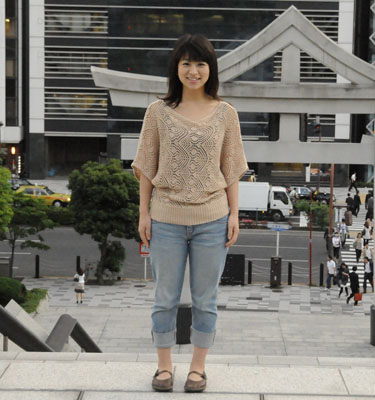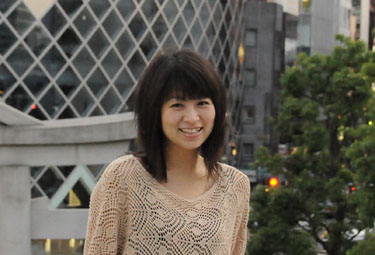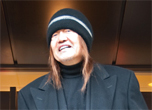
Posted: Mon Jun 21 2010
Hiroko Nakamura, freelance interpreter
Do you often come to Akasaka?
HN: I come here about once a week, because my workplace is here.
What do you do?
HN: Mainly I work as a freelance interpreter. I have a contract with one particular person whose interpreting I am in charge of, so that work schedule always takes highest priority. Apart from that, I also work on a podcast. But generally I work from home, so there are also days when I don’t leave the house at all! [Laughs]
What kind of podcast do you do?
HN: It’s called ‘EnglishPod101.com’, and it’s a fun environment for learning English with the feel of a radio broadcast.
Is being a podcaster something that is easy to do then?
HN: Actually, originally I did my own video broadcast, ‘Hirokochannel’ which was an introduction to Japanese culture aimed at people from abroad. I shared my own experiences of being treated like a foreigner, from when I lived in America, and I introduced elements of Japanese culture that are difficult to see if you are from another country. Things like that. It’s really fun to do, but I was really happy about how people from all around the world were able to share it and enjoy it too. It’s really interesting to get comments from people in countries I’ve never even been to, like Poland.
You do a lot of different things! Is there anything else you haven’t mentioned yet?
HN: I also work on a web broadcast called ‘Akibatteru’, which is mainly news and information about Akihabara for people overseas. We talk about different shops and events that are happening, but it’s really interesting because it takes me to places that I wouldn’t usually go to. The blood donation centre, Akiba:F Blood Donation Room, was really good. I also went to the Gundam Café, which opened in April. I also do private English lessons. I teach with a mix of business and conversational English, so it’s probably quite tough! [Laughs]
Apart from Akasaka, is there anywhere else you visit often?
HN: I like places with a lot of natural scenery, so I often go to Futako-Tamagawa. There’s a place called the Okamoto Park Old Farmhouse Garden, which has a thatched-roof farmhouse in it, and it’s one of my favourites. I like the countryside. I like the Todoroki Valley too.
So you don’t really go into the city much?
HN: No, I like to find places that aren’t crowded and busy with people. I’ve never really liked expensive, up-market things, so I’ll always end up going to places like parks and the countryside.
Do you ever go out to eat?
HN: I don’t really eat out often… Oh, but I like Kanda Yabu soba in Awajicho, so sometimes I go there. Their soba noodles are delicious, but it’s a little expensive [Laughs], so I treat myself about once a month. Apart from that, I usually cook things myself.
More from Hiroko:

‘I came to Tokyo from Fukuoka. Home was so far out in the countryside – if you wanted to cross the river, you needed a ferry. [Laughs] Things like convenience stores being close by and people walking quickly were a novelty.’
‘Sometime I want to create a place where people can come into contact with each other through sharing a meal together. My family home is a yakitori restaurant, so I want to communicate something using the flavours my parents created.’
‘I went to Korea recently, and the people over there were so nice when they were giving directions and things like that. I felt like I could understand the worries, and feelings, that foreign visitors to Japan must have.’
Hirokochannel:www.youtube.com/user/HIROKOCHANNEL
EnglishPod101.com:www.youtube.com/user/englishpod101
Akibatteru:www.youtube.com/user/akibatteru
Tags:
Tweets
- About Us |
- Work for Time Out |
- Send us info |
- Advertising |
- Mobile edition |
- Terms & Conditions |
- Privacy policy |
- Contact Us
Copyright © 2014 Time Out Tokyo














Add your comment